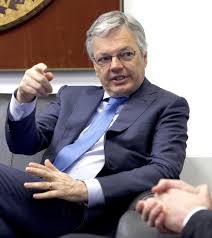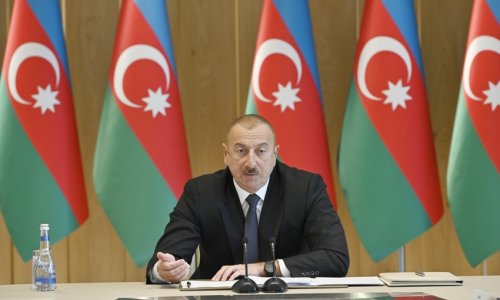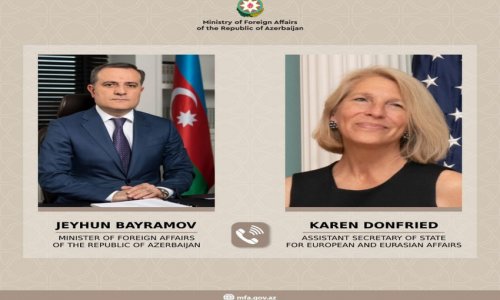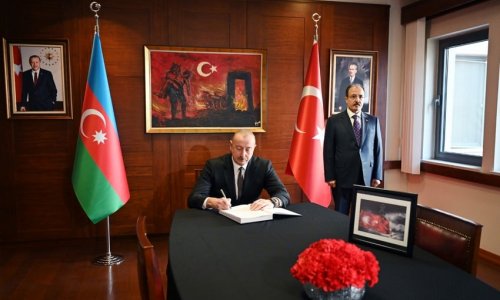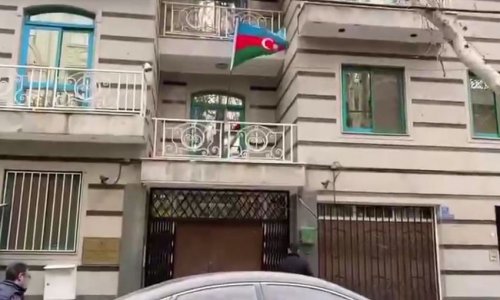Belgium is spearheading fresh efforts to find a solution to the conflict in Nagorno-Karabakh, one of Europe’s so-called frozen conflicts.
Foreign Affairs Minister Didier Reynders said the Benelux country would work for the normalisation of relations between Armenia and Azerbaijan. Reynders, Chairman of the Committee of Ministers of the Council of Europe, is just back from leading a 60-strong delegation of businessmen to the two countries.
He voiced concern about recent violence in Nagorno-Karabakh and is also reported to have been impressed by the situation of the displaced persons in Azerbaijan. The occupation by Armenia of Azerbaijani territory, and the tensions between the two neighbours, created a million refugees and internally displaced persons (IDPs).
Reynders, deputy PM in Belgium, said: "This was my first visit, and I know there are about 1 million people who came from Armenia and Nagorno-Karabakh. I believe that it is important to meet with refugees and IDPs while visiting the country. It is good to understand the scale of this problem. Because when we accept refugees in Europe, we have big debates. If you have one million displaced persons, I understand that this is a completely different situation.
"We adhere to the position of settlement of the Nagorno-Karabakh conflict within the territorial integrity of the country,” Reynders added. "We have discussed the situation with the neighboring country, Armenia, and the occupation of Nagorno-Karabakh, because we are concerned about the incidents on the frontline. We will be glad to see certain progress in negotiations with the two neighboring countries. Of course, the settlement of the conflict by military means is unacceptable, the problem should be solved within the framework of the OSCE Minsk Group.”
The Minsk Group, part of the OSCE’s efforts to find a peaceful solution to the Nagorno-Karabakh conflict, is co-chaired by France, the Russian Federation, and the United States. After meeting Reynders, Azerbaijan’s Foreign Policy Head Elmar Mammadyarov said the country continues facing a policy of "double standards” of the European countries. Reynders’ visit has re-focused international attention on the conflict. The issue is given added topicality as the EU is planning to adopt a resolution on territorial integrity of several former Soviet Republics in the Eastern Partnership Summit in Riga on 28 May.
The bloody war, which flared up in the late 1980s due to Armenia’s territorial claims against its South Caucasus neighbor, left 700,000 civilians of Nagorno-Karabakh and the regions adjoining it, as well as the regions bordering with Armenia and Nagorno-Karabakh without homes. Moreover, 250,000 Azerbaijanis were expelled from Armenia and became refugees due to Armenia’s ethnic cleansing policy after the emergence of the Nagorno-Karabakh conflict with Azerbaijan. Nagorno-Karabakh is one of the so-called frozen conflicts in the post-Soviet space. It is a landlocked region in the Southern Caucasus, de jure on the territory of Azerbaijan, but de facto governed by the Armenian-backed separatist regime not recognised by any single country around the world.
The invasion of the territory by Armenia began in 1988 with minor conflicts, but evolved into a full-scale war in 1992. Since the end of the war in 1994, Armenian and Azeri delegations have held talks about the status of Nagorno-Karabakh under the supervision of the Organisation for Security and Cooperation in Europe’s Minsk Group. Armenia is part of the Collective Security Treaty Organization, which is a military alliance of six former Soviet nations, including Belarus, Kazakhstan, Kyrgyzstan, Tajikistan and Russia. Some 20 percent territories of Azerbaijan have long been under occupation and steps taken so far have not yielded any result.
Last month, European Union Special Representative for the South Caucasus Herbert Salber said the status quo in the Armenia-Azerbaijan Nagorno-Karabakh conflict is "not acceptable” and that the conflict could not be considered frozen. Meanwhile, Peter Tase, an expert on international relations at Marquette University in the U.S, has accused the EU of "turning a blind eye” towards the pro-European aspirations of Azerbaijan.
"The EU is also favoring Yerevan despite the fact that Armenia is a trusted satellite of Russia. The latter is experiencing heavy economic sanctions from the West and EU countries.” "Armenia, a member of Eurasian Economic Union (EAU) has a tarnished and underdeveloped economy,” he said. "It has a biased foreign policy which is closely coordinated with Moscow. It conducts consistent campaigns towards manipulating the Southern Caucasus history. It is also causing irreparable damage to image of Azerbaijan in the world.”
Tase added that on the other hand, Baku’s foreign policy and attitude in international affairs is as mature and sophisticated as any other country of Western Europe. "Azerbaijan’s promotion of peaceful solution of the current obstacles that hinder national territorial integrity of the country is one of the essential values of Western moral thought and traditions,” he said. A centre-right German MEP told this website: "Azerbaijan is a country that is part of the Muslim world. At the same time, it is an exemplary country of the Western world, which can become a model. But it is not so easy in the geopolitical area in which Azerbaijan is located. Azerbaijan’s leadership is doing its best to achieve this.
"Every day and every moment we see the attempts to exert pressure on Azerbaijan. The press and NGOs also join this process. The funds are also allocated for this. Why is it so? Today, Azerbaijan has been demonstrating a model of stability, security and development.”
The current situation in Ukraine at present and that of the Nagorno-Karabakh conflict was highlighted in a recent op-ed in The Washington Times by Maayan Jaffe, a former editor-in-chief of the Baltimore Jewish Times. She writes: "Despite attempts at dialogue and cease-fires, Russia continues to systematically eat away at Ukraine. America, therefore, continues to threaten further sanctions and consequences against Russia. America has pressed its European allies to stand up to Russian President Vladimir Putin — and that’s good and right.
"But why is America not doing the same for its ally in the Caucasus region, for Azerbaijan? Where is the consistency necessary for a sustainable and successful U.S. foreign policy? For more than 20 years, Armenia has waged an ongoing, illegal occupation and ethnic cleansing in Nagorno-Karabakh and seven other adjacent regions of Azerbaijan — in violation of its sovereignty and territorial integrity.”
Nagorno-Karabakh and these other districts have historically belonged to Azerbaijan and have been recognized as belonging to Azerbaijan by the international community. Yet, they have remained under Armenian occupation for more than two decades, since 1992 despite European Parliament, UN, Council of Europe and OSCE resolutions calling for the immediate withdrawal of the Armenian troops from the occupied Azerbaijani territories.
(eureporter.co)
www.ann.az
Follow us !

